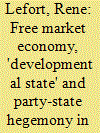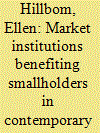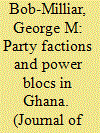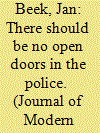|
|
|
Sort Order |
|
|
|
Items / Page
|
|
|
|
|
|
|
| Srl | Item |
| 1 |
ID:
120909


|
|
|
|
|
| Publication |
2013.
|
| Summary/Abstract |
In 1999, the year before Ghana's 2000 election, the country experienced a large, unexpected decline in aid. The incumbent National Democratic Congress (NDC) lost the election. Did the decline in aid hurt the NDC at the polls, or was it simply incidental? Using data from a national, World Bank-funded electrification project, this article shows that the NDC was able to allocate aid according to explicitly political criteria. The article also exploits a quasi-experiment in aid disbursements to show that electrification caused NDC voting to increase in the constituencies that received electrification. Pre-electoral aid fluctuations exert a modest but measurable force on voting patterns. These findings add weight to calls for donors to coordinate to reduce aid volatility. They also show that incumbent governments can allocate aid strategically to secure votes, even under the best-case scenario of strict donor monitoring in an established democracy.
|
|
|
|
|
|
|
|
|
|
|
|
|
|
|
|
| 2 |
ID:
120912


|
|
|
|
|
| Publication |
2012.
|
| Summary/Abstract |
Ethiopia's development strategy rests on the promotion of a market economy, driven by 'new entrepreneurs', both urban and rural, while, to bring it to 'maturity' and to compensate for its present 'failures', the resolute intervention of a 'developmental state' is essential. Simultaneously, the ruling party aims to sustain its political hegemony by enrolling massively among those at the top of the social pyramid, to which most of these 'new entrepreneurs' belong, so as to build its new constituency on them. In the rural areas (83% of the population), the merger of these two objectives leads to the mobilisation of the upper group of smallholder farmers, recruited both as 'model farmers' to become the engine for the growth, notably with the support of a massive public Agricultural Extension Programme, and also as members of the ruling party. However, the subordination of the regime's economic objectives to its political agenda undermines the implementation of its development strategy at the field level. This raises questions about the efficiency of the programme and the room left for entrepreneurship, even though this is a mainstay of the market economy that the regime sees as 'vital' for Ethiopia's 'survival' (Meles 2006).
|
|
|
|
|
|
|
|
|
|
|
|
|
|
|
|
| 3 |
ID:
120911


|
|
|
|
|
| Publication |
2013.
|
| Summary/Abstract |
Smallholders in developing countries can potentially benefit from access to local, regional, national and international markets as they intermediate between rural and urban demand for agricultural products and smallholder supply. This study investigates how smallholders in Meru, Tanzania make use of the various marketing channels that are available to them, and argues that the variety of potential marketing channels and easily accessible market information enables smallholders to weigh advantages and disadvantages with varying market opportunities and form rational decisions. It presents a case where producers, consumers and traders are the principal agents in building market institutions through what should be characterised as endogenous processes. As these market institutions correspond to smallholders' needs, they may be able to play an important role in the overall process of agricultural development in the area.
|
|
|
|
|
|
|
|
|
|
|
|
|
|
|
|
| 4 |
ID:
120910


|
|
|
|
|
| Publication |
2012.
|
| Summary/Abstract |
In February 2011, Ugandan President Yoweri Museveni resoundingly won re-election. In the aftermath of the vote, which many had predicted would be competitive, analysts and opposition supporters ascribed Museveni's victory to massive pre-election spending on public goods, creation of new administrative districts, and vote buying. While the opposition could not compete with Museveni and his National Resistance Movement in access to resources, our analyses of survey data, from two pre-election surveys conducted by Afrobarometer in November/December 2010 and January 2011, and a pre- and post-election panel study, find little evidence that Museveni benefited significantly from public goods outlays, district creation, and vote buying. Additionally, we find little evidence that fear and intimidation were responsible for the results. Instead, the data suggest that Museveni's re-election was driven by an uninspiring opposition slate, widespread satisfaction with macro-economic growth, and an improved security situation, particularly in the Northern Region.
|
|
|
|
|
|
|
|
|
|
|
|
|
|
|
|
| 5 |
ID:
120908


|
|
|
|
|
| Publication |
2013.
|
| Summary/Abstract |
Competition for the executive leadership of a political party and the distribution of state patronage in Ghana is influenced by factional alignments and group interests. In December 2008 the National Democratic Congress (NDC) regained political power, and within months rifts appeared over the allocation of ministerial portfolios. The intra-party murmurings became public when two factions supported rival candidacies for the party's presidential nomination. The pro-Rawlings faction supported the candidacy of Nana Konadu Agyemang-Rawlings, and the anti-Rawlings bloc backed President John Evans Atta Mills. Drawing on Boucek's (2009) typology of factionalism, this article argues that factionalism within the NDC is a dynamic and complex process of informal groupings competing and jockeying for power to satisfy members' interests. It draws three conclusions: party factions are ad hoc groupings that are nurtured into a power bloc, and are constellated around particular individuals; factional conflicts are not rooted in ideology, but are based on differences in policy goals, interests and patronage; and, finally, factionalism fluctuates between cooperative and competitive phases.
|
|
|
|
|
|
|
|
|
|
|
|
|
|
|
|
| 6 |
ID:
120907


|
|
|
|
|
| Publication |
2012.
|
| Summary/Abstract |
In criminal investigations by police officers in northern Ghana, the lines are fluid: civilians arrest suspects on their own, assuming the tasks of the police. Police officers are heavily influenced by civilians, often forming paid alliances with them. Yet such entanglements paradoxically enable state policing and integrate the police into society in a context of low resources and low legitimacy. Other practices limit and frame such transgressions. Using the concept of boundary work, this article analyses how actors maintain and negotiate the seemingly blurred distinction between state and society in West Africa.
|
|
|
|
|
|
|
|
|
|
|
|
|
|
|
|
|
|
|
|
|